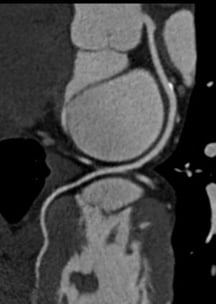
August 27, 2012 - A recent multi-center study, led by researchers from Wake Forest School of Medicine and published in the Journal of the American Medical Association (JAMA) has indicated that computed tomography (CT) scanning of the heart and measuring the coronary artery calcium (CAC) score is the most accurate predictor of cardiovascular disease for individuals at intermediate risk for heart disease.
The study included 1,300 individuals with intermediate cardiovascular risk factors (excluding diabetes) based on the Framingham Risk Score (FRS), who were followed over a period of seven years as part of the National Heart, Lung and Blood Institute's Multi-Ethnic Study of Atherosclerosis (MESA). MESA is an observational study of cardiovascular disease performed at six sites across the United States.
Six novel or established markers of heart disease risk were directly compared. These included the CT CAC score, ankle-brachial index, brachial flow mediated dilation, carotid intima-media thickness, high sensitivity C-reactive protein and family history of heart disease. CAC score, determined by CT scan, held the highest predictive association for cardiovascular disease.
According to , a co-author on the publication and president-elect of the Society of Cardiovascular Computed Tomography (SCCT), "This work demonstrates that the calcium score outperforms these widely studied tests and even family history in the prediction of future heart attacks and cardiovascular death. For healthcare providers, we have the first direct comparison of these tests. This new evidence will help in advising our patients when additional information is needed to refine an individual's risk of heart disease. In many cases, no additional testing is needed; however, for those important cases where refining our understanding of risk of heart disease is critical to medical decision-making, the cardiac CT measured calcium score is a clear winner as relates to future risk for an individual."
Although CAC scans indicated the highest level of accuracy in predicting cardiovascular risk, factors such as cost and the level of risk due to radiation exposure from CT scan will be future considerations in research.
For more information, visit www.SCCT.org


 February 09, 2026
February 09, 2026 









